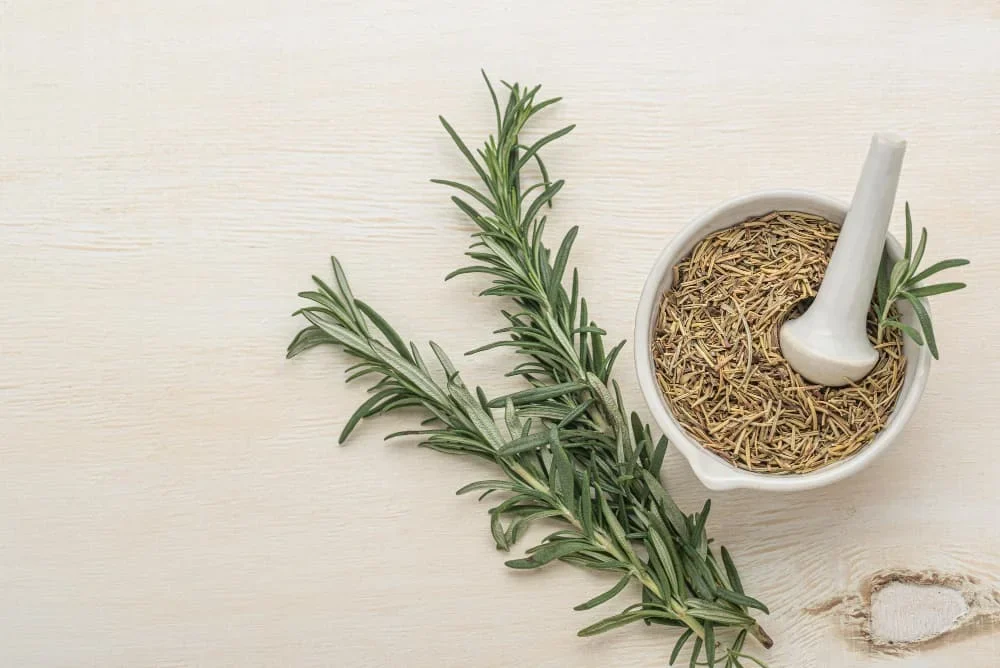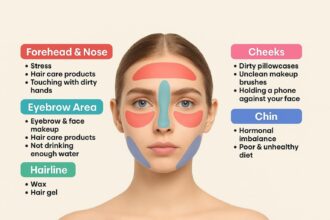For centuries, rosemary oil has been valued for its natural healing properties, particularly in hair care. Traditionally used to support scalp health and promote stronger hair, this essential oil has gained renewed attention for its potential role in reducing hair thinning and supporting growth.
But does science back up these claims?
This article explores the science-backed benefits of rosemary oil, its effects on hair growth, scalp health, and reducing hair fall. We’ll also cover how to use it effectively, potential side effects, and whether it truly lives up to the hype. Our goal is to provide a well-researched perspective on its role in hair care, helping you determine if it’s right for your routine.
What is Rosemary Oil?
Rosemary oil is a concentrated essential oil extracted from the leaves and flowering tops of the Rosmarinus officinalis plant. Native to the Mediterranean region, this evergreen shrub has a long history of use in cooking, medicine and aromatherapy.

Traditional Uses of Rosemary
✔ Culinary – A flavorful herb in Mediterranean cuisine.
✔ Medicinal – Used in traditional medicine for memory enhancement, pain relief, and scalp stimulation.
✔ Aromatic – Found in perfumes, incense, and aromatherapy for its invigorating scent.
The oil itself is typically pale yellow to colorless, with a strong woody, camphoraceous aroma. It contains bioactive compounds such as 1,8-cineole (eucalyptol), camphor, α-pinene, and β-pinene, which contribute to its antimicrobial, anti-inflammatory, and scalp-stimulating properties.
Due to its high potency, this oil should always be diluted before topical use.
The Science-Backed Benefits of Rosemary Oil for Hair
Rosemary oil has transitioned from a traditional remedy to a subject of growing scientific interest, particularly for its role in hair and scalp health. While more research is needed, current studies suggest it may help in stimulating hair growth and supporting follicle health.

1. Supports Hair Growth
One of the most exciting aspects of rosemary oil is its potential to encourage hair regrowth. It is believed to work by enhancing circulation in the scalp, ensuring hair follicles receive essential nutrients and oxygen.
A 2015 study compared rosemary oil to 2% minoxidil, a common hair regrowth treatment, in people with androgenetic alopecia (pattern baldness). Results showed similar improvements in hair count, with fewer reports of scalp irritation in the oil group. However, further research is needed to confirm these effects.
2. May Reduce Hair Loss
Beyond supporting new growth, rosemary oil may help slow down hair shedding by potentially blocking dihydrotestosterone (DHT), a hormone linked to hair thinning. Some studies suggest it inhibits 5-alpha reductase, the enzyme that converts testosterone into DHT, which contributes to hair loss.
Additionally, its antioxidant and circulation-boosting properties may support a healthier scalp environment, reducing excessive shedding.
3. Promotes Scalp Health
A healthy scalp is key to strong hair, and rosemary oil may help address common scalp concerns:
✔ Anti-Inflammatory Effects – May soothe scalp irritation, making it beneficial for sensitive or inflamed scalps. Some research suggests it may also help reduce dandruff.
✔ Antimicrobial Properties – Known for antifungal and antibacterial effects, it may help control scalp imbalances that contribute to hair thinning.
4. May Strengthen Hair Strands
While further research is needed, some experts suggest this oil may strengthen hair, reducing breakage and split ends. This could be linked to its ability to enhance circulation and improve nutrient absorption at the root level.
How to Use Rosemary Oil for Hair
If you’re looking to integrate rosemary oil into your routine, it’s essential to use it correctly. Since this oil is highly concentrated, proper dilution and application are necessary to avoid irritation.

Dilution Guidelines
✔ Mix 2-3 drops of rosemary oil per 1 tablespoon (15 mL) of carrier oil.
Carrier Oil Options
✔ Coconut Oil – Deeply moisturizing, ideal for dry or damaged hair.
✔ Jojoba Oil – Mimics natural scalp oils, great for all hair types.
✔ Argan Oil – Rich in antioxidants and fatty acids, perfect for frizzy hair.
✔ Grapeseed Oil – Very lightweight, suitable for oily scalps.
Best Application Methods
✔ Scalp Massage – Apply diluted oil to fingertips and gently massage the scalp to boost circulation. Leave on for 30 minutes to overnight before rinsing.
✔ Hair Mask Addition – Mix a few drops of diluted oil into your favorite hair mask for extra nourishment.
✔ Shampoo/Conditioner Mix – Add diluted oil to your shampoo immediately before use (do not mix in the entire bottle).
✔ Rosemary Water Rinse – Mix 10-15 drops with 750mL of water and use as a final rinse after shampooing.
Patch Test Before Use
Before using oil on your scalp, it’s essential to perform a patch test to avoid irritation:
✔ Apply a small amount of diluted oil to the inside of your elbow.
✔ Wait 24 hours to check for redness, itching, or irritation before full application.
Frequency & Duration
✔ Use rosemary oil 2-3 times per week for best results.
✔ Leave it on for 30 minutes to a few hours or overnight before rinsing, based on your preference and scalp sensitivity.
DIY Rosemary Oil Recipes for Hair
Creating your own rosemary-infused oil at home is a natural and cost-effective way to enhance your hair care routine. Here’s a simple method:
Ingredients:
- Fresh rosemary sprigs (enough to fill 3/4 of a jar)
- Carrier oil (e.g., olive, coconut, almond, jojoba oil)
Instructions:
- Wash and dry the rosemary completely to prevent mold formation.
- Slightly crush the sprigs to release natural oils.
- Place rosemary in a clean, dry glass jar and pour the carrier oil over it.
- Seal the jar and store it in a warm, sunny spot for 2-4 weeks. Shake occasionally.
- Strain the oil using a fine-mesh sieve or cheesecloth, then transfer to a clean container. Store in a cool, dark place.
Note: This method makes rosemary-infused oil, not essential oil, which requires special distillation equipment.
Potential Side Effects and Precautions
While rosemary oil is generally safe, some people may experience side effects.
✔ Skin Irritation – Can cause redness or itching, especially when used undiluted. Always perform a patch test before full application.
✔ Pregnancy & Medical Conditions – Avoid use if pregnant, breastfeeding, epileptic, or managing high blood pressure, unless cleared by a doctor (Mount Sinai).
✔ Drug Interactions – May interact with blood thinners, blood pressure medications, and diuretics. Consult a doctor before using.
Conclusion
Rosemary oil has emerged as a popular natural remedy for scalp health and hair regrowth, with some studies suggesting it may rival conventional treatments in certain aspects. While research is still ongoing, existing evidence and centuries of traditional use point to its potential benefits.
However, it’s not a miracle cure, and results will vary based on individual factors. If you experience significant hair loss, consult a dermatologist or trichologist to identify the underlying cause and explore the best treatment options for you.
Frequently Asked Questions (FAQs)
1. What’s the difference between rosemary oil, water and tea?
- Oil – Highly concentrated essential oil; must be diluted before use.
- Water – A hydrosol (distillation byproduct) or a homemade rinse made by steeping rosemary in water.
- Tea – Made by steeping fresh or dried rosemary in hot water; contains lower concentrations of active compounds.
2. Can I use rosemary oil on all hair types?
Yes! However, application methods may vary:
✔ Fine or Oily Hair – Use as a pre-shampoo treatment to prevent greasiness.
✔ Thick or Dry Hair – Leave it in for longer periods or overnight for deep hydration.
3. Can rosemary darken hair?
Some anecdotal reports suggest long-term use may slightly darken hair, but there’s no strong scientific evidence to support this claim.
4. How long does it take to see results?
Results vary, but many users notice improvements after 2-3 months of regular use.
5. Can I mix rosemary oil with other essential oils for hair growth?
Yes! Popular combinations include:
✔ Lavender oil – Soothing for scalp irritation.
✔ Peppermint oil – Stimulates circulation.
✔ Cedarwood oil – May support hair thickness.
6. Can I leave rosemary oil on my hair overnight?
Yes, but ensure it’s properly diluted to prevent scalp irritation.
7. Is rosemary oil effective for dandruff?
Yes, its antimicrobial and anti-inflammatory properties may help reduce dandruff.
8. Should I consult a dermatologist before using rosemary oil?
If you have scalp conditions, sensitive skin, or are pregnant, consult a dermatologist before use.
📌 References:






